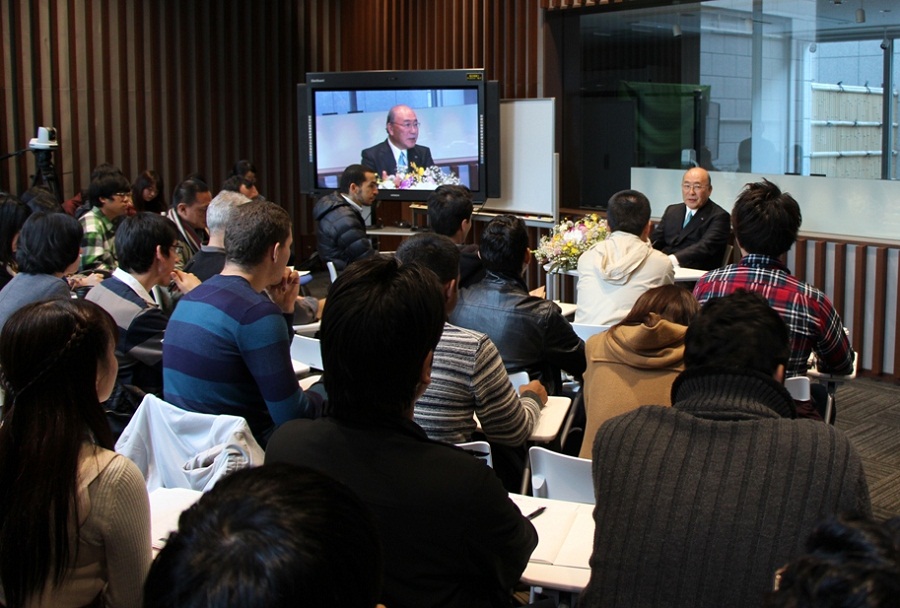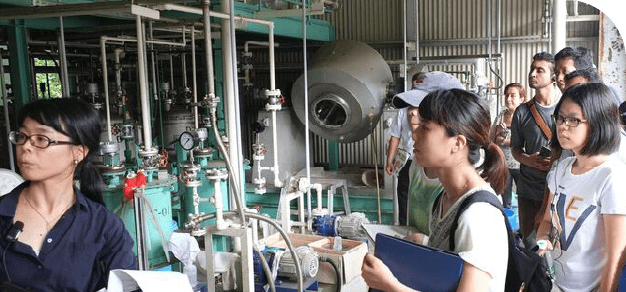GRM Students’ Reports
Global Leadership Forum: Globalization process of leading company
Graduate School of Social Studies Yujiro MINAMI
2013/11/26
Global Leadership Forum
Date: Nov.26 (Tue), 2013
Venue: IMADEGAWA(Karasuma Campus) Shikokan Learning-Studio
Theme: "Globalization process of leading company"
Lecturer: Mr. Atsutoshi Nishida (Director,Chairman of the Board, Toshiba Corporation)
*********************************************
“a processing of corporate globalization and global leadership competencies”
The lecture consisted of 3 parts;
-What Globalization imposes onto global companies
-Important factors to bear in mind
-Global leadership competencies
Firstly, global companies have to struggle with the triangle dilemma among sustainable development, resource management, and environmental management. In Japan, the current government has been seeking to recover from crisis with “3 arrows” after failures of 12 Growth Strategy in the past. In other words, it is questioned whether the government can show its execution capability.
Secondly, based on such globalizing situation, the global companies should bear the following factors in mind upon their management, especially factor 1. and 2. were put importance on;
1.Continuous Innovation : to create new “value” to market through process innovation in manufacturing and value innovation such as work-life balance.
2.Pursuit of efficiency : to enhance continuously productivity, especially in service industry, finding out mistakes, points to be modified, and waste, which are to be improved.
3.Mitigation of risks : to deal with Economic crisis and Natural disasters.
4.“Corporate” Management of various business : to deal with intensifying competition and velocity of globalization.
5.CSR(Company Social Responsibility) for survival of human being : environmental management.
Thirdly, when it comes to global leadership competencies, 3 capabilities were pointed out as follows;
1.Capability for judgment : to grasp the current situation, to analyze what to improve, and to make clear what to do.
2.Decision-making capability : to decide what to do.
3.Execution capability : to accomplish the objectives.
A recent environmental crisis has been depicted by the issues such as climate change, which embodies global interdependencies in which one country has significant outcomes for developments elsewhere(Dominelli 2012:87).
Such crisis stems out, as agreed broadly, from industrialization and urbanization for people. Industrialization has produced pressures for centralization and the development of urban environments and built-infrastructures that are driven by the creation of opportunities for business to make profits and people following the employment prospects that these present(Dominelli 2012:42).
As advanced countries such as U.S., Japan, EU, and so on, are said to be responsible for such crisis as being “Polluter”, global companies are to owe the Globe for their footprints through their globalization process. It is obvious that global companies are for profit if their only stakeholders are shareholders. However, at the same time, they exist in the society, and the society consists of communities. That means that global companies cannot survive without making communities and people there participate in discussion and decision-making.
To be obvious, we inevitably need to have a leader as the driving force to accomplish the world’s mission as said above. The point of view upon how to create participative system towards judgment, decision-making, and execution is required for the leader of global companies. Time is for Co-production(Pestoff and Brandsen 2008) among multi stakeholders.
【Reference】
Dominelli L.(2012)Green Social Work From Environmental Crisis to Environmental Justice, Polity Press
Pestoff V. and Brandsen T.(2008)Co-production The Third Sector and the Delivery of Public Services, Routledge



